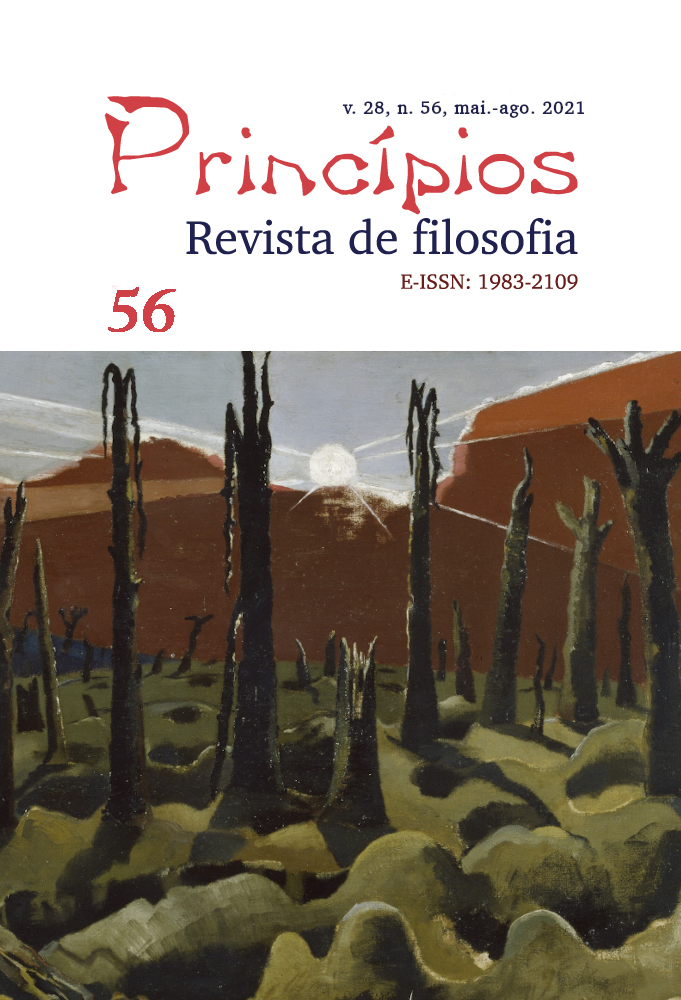Antropoceno e com-posição (Ge-stell): Uma época provocada pelo humano ou na qual ele é provocado?
DOI:
https://doi.org/10.21680/1983-2109.2021v28n56ID23057Palabras clave:
antropoceno, humano, com-posição, Ge-stellResumen
Há duas décadas a comunidade científica debate a possibilidade de o planeta Terra ter entrado em uma nova era. Não mais o holoceno, mas o antropoceno. Defende-se que o humano se tornara causa eficiente das mais influentes nos processos geológicos e biológicos deste planeta. Dentre as várias propostas que visam identificar as origens desta nova era há aquela que acena para uma “Grande Aceleração” industrial e populacional que ocorre a partir dos anos 1950. Nessa mesma década Martin Heidegger começava a ensaiar em suas reflexões uma palavra que previa a essência da nossa época: com-posição [Ge-Stell]. O presente artigo busca avaliar a proposta de diagnóstico do antropoceno a partir de algumas investigações empreendidas por Heidegger. Para tal, estrutura-se da seguinte forma: primeiro, uma breve introdução ao debate científico sobre o antropoceno em paralelo à apreciação de um estásimo da Antígona; depois adentraremos na reflexão de Heidegger sobre a essência do humano, precisamente em sua interpretação do mesmo estásimo de Sófocles; por terceiro faremos uma exposição da interpretação heideggeriana sobre a era da com-posição.
Descargas
Citas
CRUTZEN, P. J.; STOERMER, E. F. The ‘Anthropocene’. Em: IGBP Newsletter 41: 12. 2000.
HEIDEGGER, Martin. Einführung in die Metaphysik [1935-36]. Frankfurt am Main: Vittorio Klosteramnn, 2003. (Gesamtausgabe, Band 40). (Tradução pt-BR.: Introdução à metafísica. Traduzido por Emmanuel Carneiro Leão. 4a ed. Rio de Janeiro: Tempo Brasileiro, 1999)
HEIDEGGER, Martin. Das Ge-stell. Em: ___, Bremer und Freiburger vorträge [1949]. Frankfurt am Main: Vittorio Klosteramnn, 1994. (Gesamtausgabe, Band 79) (Tradução: Positionality. Em: ___, Bremen and Freiburg Lectures: insight into that whit is and basic principles of thinking. Tradução de Andrew J. Mitchell. Indiana University Press, 2012. (Studies in Continental thought))
HEIDEGGER, Martin. Die Frage nach der Technik [1953]. Em: ___, Vorträge und Aufsätze. Frankfurt am Main: Vittorio Klostermann, 2000. (Gesamtausgabe, Band 7). (Tradução pt-BR: A Questão da Técnica. Em: ___, Ensaios e Conferências. Tradução de Emmanuel Carneiro Leão. Petrópolis: Vozes, 2008.)
KUNNAS, J. Storytelling: From the early Anthropocene to the good or the bad Anthropocene. Em: The Anthropocene Review, 4 (2). 2017.
SÓFOCLES. Antigone. Em: Hugh Lloyd-Jones e Nigel Guy Wilson (org.), Sophoclis fabulae: recognoverunt brevique adnotatione critica instruxurent. New York: Oxford University, 1990.
STEFFEN, W.; BROADGATE, W.; DEUTSCH, L.; GAFFNEY, O.; & LUDWIG, C. The trajectory of the Anthropocene: The Great Acceleration. Em: The Anthropocene Review, vol.2, 2015.
Descargas
Publicado
Cómo citar
Número
Sección
Licencia
Autores mantêm os direitos autorais e concedem à revista o direito de primeira publicação, com o trabalho simultaneamente licenciado sob a Licença Creative Commons Attribution que permite o compartilhamento do trabalho com reconhecimento da autoria e publicação inicial nesta revista.
Termos da licença:
| Não Comercial (NC) | Os licenciados podem copiar, distribuir, exibir e executar a obra e fazer trabalhos derivados dela, desde que sejam para fins não comerciais. |
| Compartilha Igual (SA) | Os licenciados devem distribuir obras derivadas somente sob uma licença idêntica à que governa a obra original ou menos restritiva. |


 Português (Brasil)
Português (Brasil) English
English Español (España)
Español (España) Français (Canada)
Français (Canada)


